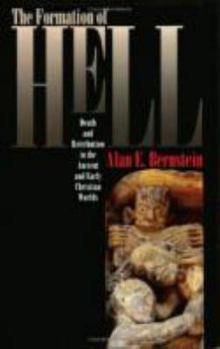The Formation of Hell: Death and Retribution in the Ancient and Early Christian Worlds
Select Format
Select Condition 
Book Overview
What becomes of the wicked? Hell--exile from God, subjection to fire, worms, and darkness--for centuries the idea has shaped the dread of malefactors, the solace of victims, and the deterrence of believers. Although we may associate the notion of hell with Christian beliefs, its gradual emergence depended on conflicting notions that pervaded the Mediterranean world more than a millennium before the birth of Christ. Asking just why and how belief...
Format:Hardcover
Language:English
ISBN:0801428939
ISBN13:9780801428937
Release Date:November 1993
Publisher:Cornell University Press
Length:408 Pages
Weight:1.62 lbs.
Dimensions:1.4" x 6.5" x 9.5"
Age Range:18 years and up
Grade Range:Postsecondary and higher
Customer Reviews
2 ratings
Where did the idea of hell come from?
Published by Thriftbooks.com User , 14 years ago
"The Formation of Hell" by Alan E. Bernstein is a tour de force. A well-written and definitive study, this book explores the history of the earliest ideas of what happens after death. Bernstein presents the concepts of hell espoused in Mesopotamia, Egypt, Greece, Rome, Israel, and finally the early Christian ideas from the New Testament. Also included in this study are relevant extracanonical books such as the "Book of Enoch" in the late ancient Jewish belief. In the early Middle Ages when Christianity was not yet fully institutionalized nor had political power, a wide variety of views of hell were articulated in such writings as the "Gospel of Nicodemus," the "Apocalypse of Peter," the "Apocalypse of Paul," and the teachings of Origen. Finally Augustine systematized the early church's beliefs and formulated the first theology of the afterlife and hell. Before I read this book, I had no idea of the myriad beliefs ancient people held on what happens after death. They varied from Hades (or Sheol in the Judaic tradition), a neutral place where the dead exist in a kind of gloom with no differentiation between the good and the wicked, to Tartarus, the Greek place of moral punishment that was similarly taken up by Christian writers and called Hell. But what was this place of punishment? How did the Greek ideas influence Christian ones? Were those who had done evil in their lives on earth subjected to eternal retribution or was there a chance that through Christ's authority over the underworld they could gain redemption? Where is the balance between justice and mercy? How permeable is the barrier between life and death? Can prayers or dedicatory rites help the dead? Where did the idea of purgatory come from? This non-judgmental history explains and traces the ideas across the ancient Western world. For those who are curious about how such concepts developed, varied from civilization to civilization, fit in with philosophy, and were formulated, the book is a rich feast. Further, it affords a fresh view into Jewish and Christian scriptures that helps make sense of different parts, especially, for me, the New Testament "Book of Revelation." Following the main index is an index of biblical references used in the book, from the Hebrew Bible through the New Testament. For the first time I came to see that what Paul taught about the afterlife, as recorded in his letters, was quite different from the perspective espoused by Matthew, Mark, and Luke. The Gospel of John, although written later, is much more closely aligned with the letters of Paul. I am now awaiting Alan Bernstein's next volume. He has gained a fan in me.
Comprehensive Review of Hell Mythology
Published by Thriftbooks.com User , 17 years ago
This is a very good summary of the myths and theologies of the afterlife that developed in the Mediterranean cultures, from ancient Egypt and Sumer to the Judaeo-Greco-Roman religions. The author contrasts the varying philosophies of a neutral death to that of retribution and punishment, perfected by Christianity's most influential early theologian, Augustine of Hippo. The philosophical differences that involved the question of divine justice and mercy resulted in the Catholic Church's compromise of purgatory serving as a form of redemptive weigh-station for those whose lifetime sins were not so egregious as to merit eternal damnation, though I thought some of the arguments used by Augustine were themselves as tortured as the damned he evidently wanted punished for rejecting God. The discussions involving the apocryphal texts, the Apocalypses of Paul and Peter, emphasized the obsession with gory and grisly retributions, a tendency amongst Christians that even today's so-called evangelicals have adopted to excess themselves. Though at times a bit dense on writing style this is by its nature an academic and scholarly subject on a subject pregnant with implications for today's modern believer in whatever fate. To what extent are our current lives responsible for what happens afterward? The author offers no answer beyond his adept discussion of what preceded us. I recommend this to all fans of theology, ancient cultures and history and philosophy.





